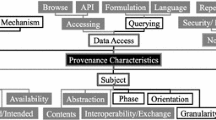Abstract
The provenance of entities, whether electronic data or physical artefacts, is crucial information in practically all domains, including science, business and art. The increased use of software in automating activities provides the opportunity to add greatly to the amount we can know about an entity’s history and the process by which it came to be as it is. However, it also presents difficulties: querying for the provenance of an entity could potentially return detailed information stretching back to the beginning of time, and most of it irrelevant to the querier. In this paper, we define the concept of provenance query and describe techniques that allow us to perform scoped provenance queries.
Chapter PDF
Similar content being viewed by others
Keywords
These keywords were added by machine and not by the authors. This process is experimental and the keywords may be updated as the learning algorithm improves.
References
Alvarez, S., Vazquez-Salceda, J., Kifor, T., Varga, L.Z., Willmott, S.: Applying provenance in distributed organ transplant management. In: Moreau, L., Foster, I. (eds.) IPAW 2006. LNCS, vol. 4145, pp. 28–36. Springer, Heidelberg (2006)
Bose, R., Frew, J.: Lineage retrieval for scientific data processing: A survey. ACM Computing Surveys 37(1), 1–28 (2005)
Bowers, S., McPhillips, T., Ludascher, B., Cohen, S., Davidson, S.B.: A model for user-oriented data provenance in pipelined scientific workflows. In: Moreau, L., Foster, I. (eds.) IPAW 2006. LNCS, vol. 4145, pp. 133–147. Springer, Heidelberg (2006)
Branco, M., Moreau, L.: Enabling provenance on large scale e-science applications. In: Moreau, L., Foster, I. (eds.) IPAW 2006. LNCS, vol. 4145, pp. 55–63. Springer, Heidelberg (2006)
Buneman, P., Khanna, S., Tan, W.C.: Why and where: A characterization of data provenance. In: Van den Bussche, J., Vianu, V. (eds.) ICDT 2001. LNCS, vol. 1973, p. 316. Springer, Heidelberg (2000)
Freire, J., Silva, C.T., Callahan, S.P., Santos, E., Scheidegger, C.E., Vo, H.T.: Managing rapidly-evolving scientific workflows. In: Moreau, L., Foster, I. (eds.) IPAW 2006. LNCS, vol. 4145, pp. 10–18. Springer, Heidelberg (2006)
Groth, P., Miles, S., Munroe, S.: Principles of high quality documentation for provenance: A philosophical discussion. In: Moreau, L., Foster, I. (eds.) IPAW 2006. LNCS, vol. 4145, pp. 278–286. Springer, Heidelberg (2006)
Hughes, G., Mills, H., de Roure, D., Frey, J.G., Moreau, L., Schraefel, M.C., Smith, G., Zaluska, E.: The semantic smart laboratory: a system for supporting the chemical e-scientist. Organic and Biomolecular Chemistry 2(2), 1–10 (2004)
Miles, S., Groth, P., Branco, M., Moreau, L.: The requirements of recording and using provenance in e-science experiments. Technical report, University of Southampton (2005)
Prud’hommeaux, E., Seaborne, A.: Sparql query language for rdf (2006), http://www.w3.org/TR/rdf-sparql-query/
Simmhan, Y., Plale, B., Gannon, D.: A survey of data provenance in e-science. SIGMOD Record 34(3), 31–36 (2005)
Zhao, J., Goble, C., Greenwood, M., Wroe, C., Stevens, R.: Annotating, linking and browsing provenance logs for e-science. In: Proc. of the Workshop on Semantic Web Technologies for Searching and Retrieving Scientific Data (October 2003)
Author information
Authors and Affiliations
Editor information
Editors and Affiliations
Rights and permissions
Copyright information
© 2006 Springer-Verlag Berlin Heidelberg
About this paper
Cite this paper
Miles, S. (2006). Electronically Querying for the Provenance of Entities. In: Moreau, L., Foster, I. (eds) Provenance and Annotation of Data. IPAW 2006. Lecture Notes in Computer Science, vol 4145. Springer, Berlin, Heidelberg. https://doi.org/10.1007/11890850_19
Download citation
DOI: https://doi.org/10.1007/11890850_19
Publisher Name: Springer, Berlin, Heidelberg
Print ISBN: 978-3-540-46302-3
Online ISBN: 978-3-540-46303-0
eBook Packages: Computer ScienceComputer Science (R0)





